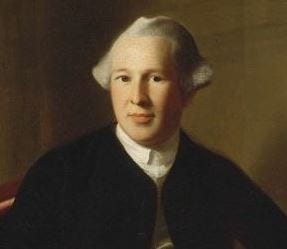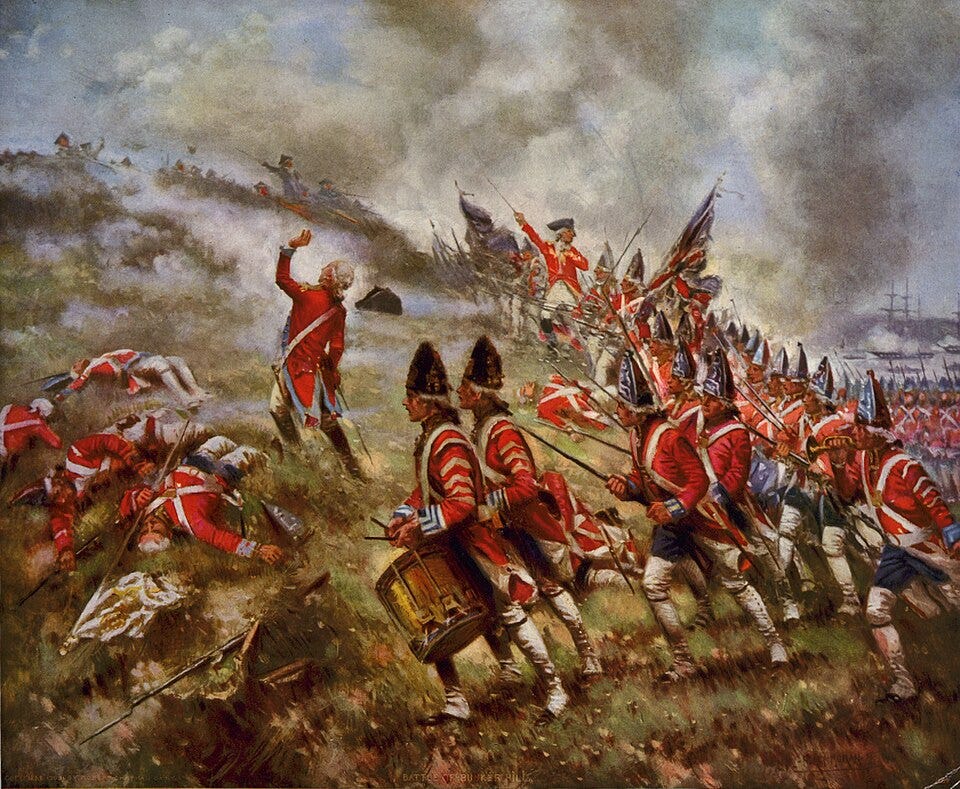If there had been a Mr. Congeniality award for the American Revolution, Joseph Warren might have been a contender. Affable, charming, brilliant — the thirty-four-year-old doctor was an energetic engine of patriotism in the Boston of 1775.
He had enrolled in Harvard at the age of fourteen. When his father was killed in an accident, he sold milk on the streets of Boston to support the family farm. His friends helped him continue his education. He studied medicine and became a popular physician. In 1764, at twenty-two, he helped fight a smallpox epidemic, inoculating many citizens, including John Adams.
Warren was among the most radical advocates for the Revolution and pushed early for a complete break with Britain. When the war started at Lexington in April 1775, he joined the fighting. Afterward, he set aside his medical practice to aid the militiamen who were besieging the British Army in Boston.
Word came to the patriots in Cambridge that the enemy were planning to occupy Charleston peninsula across the harbor from the city. The Americans rushed troops forward to get the jump on the British. They built a redoubt, a small fort, on Breed’s Hill, in front of the slightly higher Bunker Hill. Early the next morning, June 17, 1775, the American soldiers stood guard there, “fatigued by our Labour, having no sleep the night before, very little to eat.” They licked their lips and waited for the unknown.
The troops in the redoubt were led by Colonel William Prescott, a forty-nine-year-old Massachusetts farmer. He commanded roughly 1,500 men, mostly untrained volunteers. Some, thrown into their first battle, deserted. Prescott was left with about 150 men in the redoubt, the rest standing along a line of fortifications to the east. A band of New Hampshire soldiers had joined in to reinforce a fence and block the British attack.
The battle unfolded under a clear blue summer sky, watched by crowds on the roofs of buildings in Boston. At sunrise there “began a very heavy Cannonading and Bombardment,” Prescott recorded. Cannon on enemy ships and then on Copp’s Hill in Boston fired iron projectiles at the Americans crouching behind the breastworks. The booming guns reverberated for miles into the peaceful countryside.
During the morning, Dr. Warren joined the troops in the redoubt. Although Congress had named him a major general in the new Continental Army, his commission had not yet arrived. He told Prescott he would fight as a volunteer “to give what assistance I can, and to let these damn rascals see that the Yankees will fight.”
At two in the afternoon, the British landed three thousand infantrymen on the southern tip of the peninsula and prepared to attack. They marched up the hill, their muskets glistening in the sunlight. “They advanced towards us in order to swallow us up,” the twenty-two-year-old militiaman Peter Brown noted, “but they found a Choaky mouthful of us.”
Prescott’s men were low on ammunition. They held their fire until the enemy soldiers were barely fifty yards from the barricades. Then “we poured in upon them a most destructive fire,” an American soldier wrote. “The effect was tremendous. Their whole line was broken in confusion.”
The British, some of the best troops in the empire, fell back and regrouped. They attacked again. “An incessant stream of fire poured from the rebel lines,” a British officer noted, “it seemed a continued sheet of fire for near thirty minutes.” The enemy was repulsed once more.
Again the redcoats regrouped. Again their commander, General William Howe, ordered an attack, this time with bayonets. The Americans were now nearly out of ammunition. They could not fend off the enemy. Some of the patriots picked up rocks to hurl at their assailants, who came leaping over the ramparts.
Militiaman Francis Burnham was standing beside his friend amid the chaos. “When a ball struck his head, his brains flew into my face and he fell back into the ditch.” Burnham himself was wounded in the shoulder.
The Americans fled from the redoubt, their retreat covered by troops along the breastworks. “Balls flew like hail stones,” Peter Brown wrote, “and Cannon roar'd like thunder, but tho I escap'd then it may be my turn next.”
That day, it was the turn of Joseph Warren. Among the last to leave the fort as the enemy advanced, he turned with a sword he had acquired in the melee and attempted to rally the militia. An enemy bullet struck him in the face and killed him instantly.
The victory was a costly one for the British. More than a thousand of the redcoats who had marched into battle were killed or wounded, including many officers — for them, it was the bloodiest day of the entire war. The toll was high for the patriots as well, with 450 total casualties. The death of Joseph Warren was a grievous loss.
British generals, an officer wrote, “expected rather to punish a mob than fight with troops that would look them in the face.” Afterward, General Howe became more cautious in attacking the American forces. The tendency gave George Washington, the new commander in chief, the chance to survive a string of defeats early in the war.
Today, it has become fashionable in some circles to show contempt for the service of common soldiers and to use the military for personal aggrandizement. It’s worth reflecting on the courage of those who stood their ground in former days. They looked the enemy in the face in order to create a country. This too is part of our heritage.
The anniversary of the Battle of Bunker Hill this June 17th is part of the commemoration of the birth of the United States 250 years ago. It’s a great time to refresh our knowledge of the ideals and sacrifices that marked those critical years.








So timely! Thank you.
We all need to hear about real bravery. The nitpicking among local Democrats is a real disservice to our very real and large problems for Democracy, to look the enemy in the eye and resist.
Thank you.
I'm so against war, but I am amazed at the bravery and courage that the soldiers had for out country and were willing to die as well.